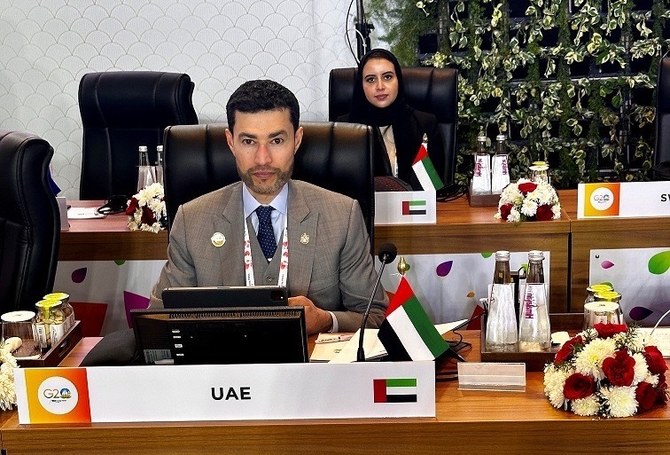
- ARAB NEWS
- 04 May 2024

RIYADH: A globally coordinated multilateral action to promote climate finance is necessary to combat climate change and mitigate its repercussions, according to UAE Minister of State for Financial Affairs Mohamed bin Hadi Al Hussaini.
Speaking at the first meeting of the G20 Finance Ministers and Central Bank Governors in Bengaluru, India, Al Hussaini said that it is pivotal to strengthen joint international action to set goals and draw strategies on climate finance investment decisions to achieve sustainable targets.
It should be noted that different entities like the International Energy Agency and McKinsey & Co., have provided estimates on the climate investment needs under different mandated emission scenarios, ranging between $3.4 trillion and $8.1 trillion annually, to achieve carbon neutrality globally by 2050.
“We have leveraged private sector participation in the development of smart cities through collaborative models that incentivize private sector involvement in areas such as clean energy, green buildings and ICT infrastructure development, which we believe to be all critical enablers for the future cities of tomorrow,” said Al Hussaini.
During the speech, Al Hussaini further noted that UAE’s gross domestic product is expected to grow by 4.2 percent in 2023, despite global economic headwinds.
“The UAE’s economy continues to withstand global effects, where we expect to achieve 4.2 percent of non-oil economic growth by the end of this year. On a global scale, there remains an immediate need for policy coordination to minimize vulnerabilities and promote food and energy security,” he added.
Earlier in November 2022, Fahad Alajlan, president of the King Abdullah Petroleum Studies and Research Center, during his speech at the UN Climate Change Conference in Sharm El-Sheikh said that nations with underdeveloped economies are not getting the support pledged in the Paris Agreement as richer countries are failing to meet their promises.
The Paris Agreement, a legally binding international treaty on climate change and net-zero emission goals signed at COP 21 in 2015, saw nations with developed economies committing to channel $100 billion per year by 2020 to assist with energy transition and frameworks to mitigate global warming.
At the event in Bengaluru, International Monetary Fund Managing Director Kristalina Georgieva said that global economic growth is set to slow in 2023 and remain below its historical average, as too many countries are failing to make ends meet.
“The international community, therefore, has a responsibility to come together to find solutions for the most vulnerable members of our global family. This calls for urgent action to strengthen the international financial architecture, especially in the area of debt resolution and strengthening the global financial safety net,” said Georgieva.
She added that G20 should strengthen the debt architecture to improve the speed and effectiveness of debt resolution.
Georgieva revealed that the IMF has approved $272 billion of financing to 94 countries since the beginning of the pandemic, of which 57 are low-income countries.
“We have also stepped up our efforts to help tackle the global food crisis. Several countries have benefited from the IMF’s new Food Shock Window, including Malawi, Guinea, and Haiti, and more are expected to do so,” added Georgieva.